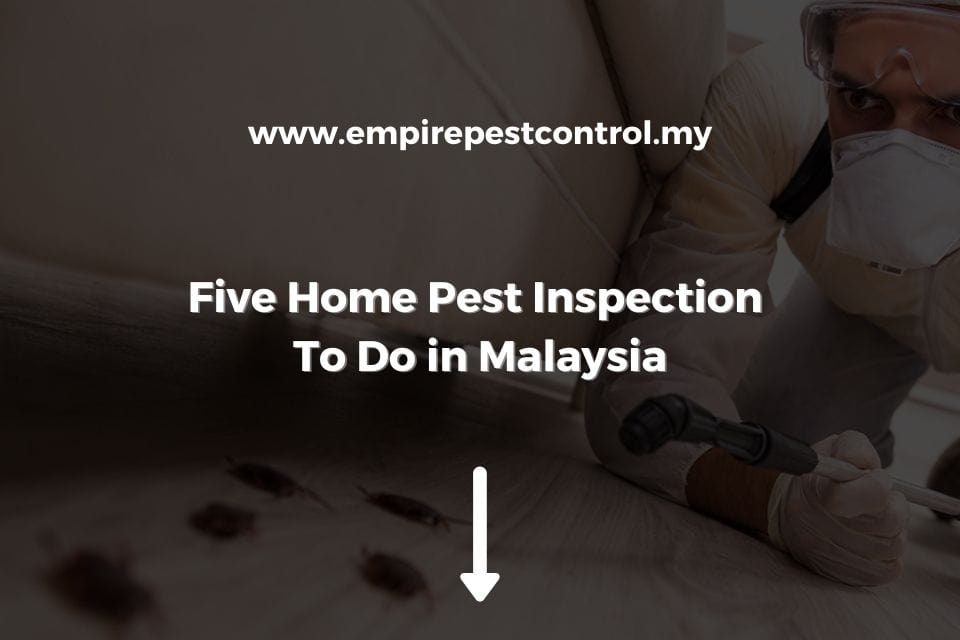Dealing with pests in your residence can be quite frustrating. It’s not only a cause for embarrassment but also poses health risks to you and your loved ones. Moreover, pests like rodents and termites have the potential to inflict significant damage to your belongings and even compromise the structural integrity of your house, leading to costly repairs. Therefore, to alleviate stress and prevent further trouble, it is highly recommended to contact a professional pest control expert for effective removal of termites, roaches, and flies.
However, before you go and call in a professional, you must first confirm if you’re really dealing with an infestation or if it’s just a few pests that can be easily be dealt with. One way to do that is to perform an inspection, and if you’re not sure how to do that, we’ve put together a list of the top tips you can follow, so take a look!
Contents
1. Look For Signs of Pest Droppings
If you have an infestation, the first thing you’ll find is droppings of feces and excrement, so keep an eye out for these items during your inspection. Begin to pay more attention to substances that imitate droppings. Pests eat a variety of foods found in your house, and they defecate while they digest and rest. Here are a few examples of droppings left behind by common household pests:
- Bed Bugs – droppings are usually found in clusters of small dots that are dark or rust black in color.
- Termites – are tiny, oval pellets that resemble sand and dust particles.
- Rats or mice – are black or dark brown and have a spindle shape similar to rice grains.
- Cockroaches – are black or brown in color and look like coffee seeds.
If you find these droppings, take note of the dropping you’ve discovered and as well as the areas where you found it.
P.S. Check out this case study on termite problems in Cheras office.
2. Be in The Look Out of Unusual Pest Smell
Many homeowners are surprised to learn that pests may emit a strange odor, particularly when they’re dead and decomposing. Rats are one of the most common pests to emit a rotting stench, and if you follow the trail, you will easily find their hiding spot.
Do not be fooled by your home’s sweet and pungent smell. The sweet and musty odor that bed bugs emit, which is apparently their pheromones, signifies an infestation. Pests also leave urine stains that stink, particularly in the sections of shelves and storerooms where they hide. Another odor source that indicates an infestation is their poops and droppings.
3. Check Structural Looks For Signs of Pest Infestation
We tend to miss obvious signs of a pest infestation since we are occupied with work and family commitments. When we get caught up in our everyday routines, specific shifts in perspective can become a blind spot. Excess dust and dirt on surfaces, for example, may appear to be due to inadequate housekeeping, but these are possible indicators of termite infestation.
Furthermore, if you begin noticing gnawing signs or scratch marks on your wooden furniture, this can also be a good indication of a rat infestation. With this in mind, you must always be on the lookout for changes in your environment.
4. Be Sure to Cover Pest-Prone Areas
Pest love to hang out in places where there is lesser human traffic, so the basement or an attic is usually their favorite hiding spot. When conducting an inspection, be sure that you check out these pest-prone areas since this is where you can significantly see the indicators of pests such as droppings and damage.
If you happen to find a pest in the said area where you’re conducting your inspection, make sure that you list them down, so you don’t forget!
5. Look For Pest Breeding Source
A pest infestation usually occurs when a specific species of pest are constantly breeding, such as termites who rapidly build their colony in just a span of one month. When you happen to find breeding nests or larvae, then this is a massive indication that there is more than one pest running around your home.
Conclusion
Pests are difficult to deal with, but you can save a lot of time by confirming that an infestation is present. As a result, always conduct a thorough review before calling in the exterminators; this will undoubtedly spare you unnecessary expense.

